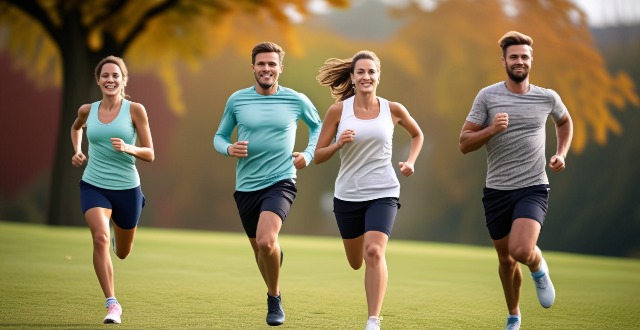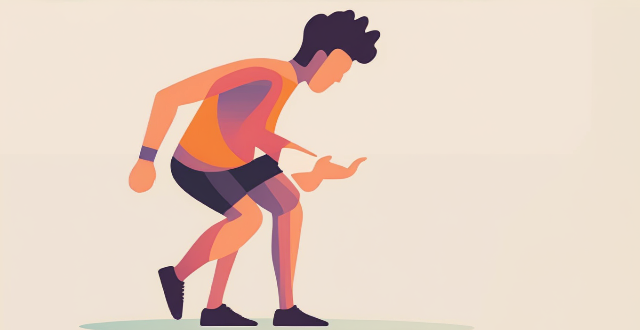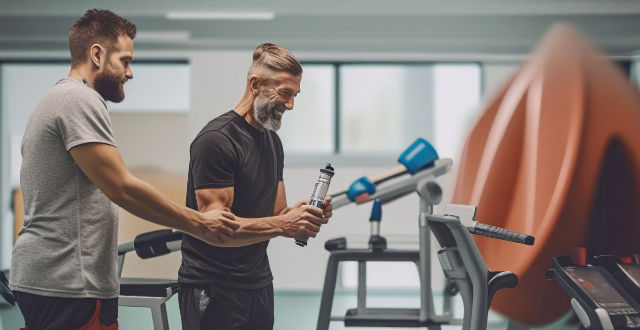Self Positive

How can women build their self-confidence in the workplace ?
The text provides a summary of how women can build self-confidence in the workplace through embracing achievements, setting realistic goals, developing new skills, practicing self-care, surrounding themselves with positive influences, speaking up and owning ideas, seeking mentorship, challenging themselves, celebrating uniqueness, and learning from failure.

How can I develop a positive mindset for sports ?
Having a positive mindset is crucial for success in sports. It can help you stay motivated, overcome challenges, and achieve your goals. Here are some tips on how to develop a positive mindset for sports: - Set realistic and achievable goals, breaking them down into smaller steps and celebrating each small victory along the way. - Practice visualization techniques, picturing yourself succeeding and using positive self-talk to reinforce these images. - Focus on the process of practicing and competing, enjoying it rather than getting too caught up in winning or losing. Celebrate your improvements, even if they are small. - Surround yourself with coaches, teammates, and friends who support and encourage you, avoiding negative influences that bring you down or make you doubt your abilities. - Embrace challenges as opportunities to learn and grow, stepping outside of your comfort zone. Accept failure as a natural part of the learning process, using it as a chance to reflect, learn from your mistakes, and improve.

What is the relationship between self-efficacy and motivation in learning ?
This article explores the relationship between self-efficacy and motivation in learning. It explains how self-efficacy affects motivation, including choice of activities, level of effort and persistence, and emotional response to setbacks. The article also provides suggestions for enhancing self-efficacy to increase motivation, such as providing opportunities for mastery experiences, modeling successful performance, offering positive feedback and encouragement, and helping students set realistic goals.

How does exercise influence self-esteem ?
Exercise has a profound impact on self-esteem, positively influencing confidence, body image, and mental health. Physical benefits include weight management through fat reduction and muscle tone, as well as improved cardiovascular health and immune system function. Mental benefits include stress reduction through endorphin release and mindfulness, and enhanced cognitive function with improved memory and problem-solving abilities. Social benefits come from community building through group activities and support systems, as well as personal achievement through goal setting and feedback. Overall, regular physical activity can significantly enhance self-esteem by promoting physical, mental, and social well-being.

How can I maintain a positive attitude when facing setbacks or injuries in sports ?
In sports, maintaining positivity amidst setbacks or injuries is crucial for well-being and recovery. To foster a positive mindset, athletes should focus on the present, set realistic goals, practice self-care, surround themselves with positive influences, embrace learning opportunities, visualize success, stay active within their limits, and seek professional help if needed. This attitude helps in both physical and mental recovery.

How does sports participation affect one's self-esteem and confidence ?
Sports participation positively affects self-esteem and confidence by providing opportunities for skill development, goal achievement, positive feedback, facing challenges, overcoming obstacles, and developing a sense of mastery.

How does sports participation influence self-esteem in children ?
Sports participation has a positive impact on children's self-esteem by increasing physical fitness, developing skills and mastery, promoting social interaction and teamwork, and encouraging goal setting and achievement.

What role does confidence play in developing a winning sports mindset ?
The article discusses the importance of confidence in developing a winning sports mindset, highlighting its role in allowing athletes to believe in their abilities, stay focused on their goals, overcome obstacles, and maintain a positive attitude. It also provides tips for building self-confidence through setting realistic goals, visualization, positive self-talk, seeking feedback, and thorough preparation.

Is there a connection between physical fitness and self-esteem ?
The article discusses the relationship between physical fitness and self-esteem, stating that engaging in regular exercise and maintaining a fit body can improve one's body image, confidence, mental health, and social interaction. In contrast, poor physical fitness can lower self-esteem by negatively impacting body image, confidence, stress levels, and leading to isolation. The author concludes that maintaining good physical fitness is essential for overall well-being and self-esteem.

Is there a link between exercise and improved self-esteem ?
This topic summary explores the relationship between exercise and self-esteem, explaining how regular physical activity can boost mental health and improve one's perception of their own worth. It discusses the types of exercise, their benefits on mental health, and evidence from research supporting the positive correlation between exercise and self-esteem. The conclusion emphasizes the importance of incorporating exercise into one's routine to enhance self-esteem.

What role does self-awareness play in self-assessment techniques ?
Self-awareness is a crucial component of self-assessment techniques, helping individuals identify strengths and weaknesses, set realistic goals, enhance emotional intelligence, improve self-confidence, and foster personal growth.

What role do sports play in improving self-esteem and confidence ?
Sports have been recognized as a powerful tool for enhancing self-esteem and confidence. This is because they provide opportunities for individuals to challenge themselves, achieve goals, and develop a sense of accomplishment. In this article, we will explore the various ways in which sports can contribute to these positive outcomes. Firstly, engaging in sports can lead to improved physical health, which in turn can boost self-esteem and confidence. Secondly, sports can also have a positive impact on mental health by releasing endorphins that reduce symptoms of depression and anxiety. Thirdly, participating in group activities can help individuals develop communication skills and build relationships with others who share similar interests. Fourthly, achieving goals in sports can lead to a sense of accomplishment and pride that translates into other areas of life. Finally, overcoming challenges in sports can teach individuals valuable lessons about resilience and determination. Overall, sports play a significant role in improving self-esteem and confidence by providing opportunities for physical health benefits, mental health improvements, social interaction, goal setting and achievement, and overcoming challenges.

In what ways do sports enhance self-esteem and confidence ?
Participating in sports can significantly boost an individual's self-esteem and confidence. Here are some ways how: 1. Achieving Goals 2. Overcoming Challenges 3. Social Interaction 4. Physical Health 5. Learning New Skills 6. Receiving Feedback 7. Leadership Opportunities 8. Competition Experience 9. Wearing Uniforms 10. Public Performance

What methods do sports psychologists use to boost confidence and self-esteem in athletes ?
Sports psychologists employ various methods to boost athletes' confidence and self-esteem, including goal setting, visualization, feedback, cognitive restructuring, stress management, and social support strategies. These techniques help athletes set clear objectives, mentally prepare for competition, receive constructive feedback, challenge negative thoughts, manage stress, and feel supported by their team, ultimately enabling them to perform at their best.

How do I moderate interactions in a live stream to maintain a positive environment ?
The article provides a comprehensive guide for moderating interactions during a live stream to ensure a positive environment. It emphasizes setting clear guidelines, engaging with the audience, utilizing moderation tools, maintaining a professional demeanor, and encouraging positive interactions. By implementing these strategies, hosts can foster an enjoyable and respectful experience for both themselves and their viewers, contributing to the growth and health of their community.

How do psychological factors, such as confidence and self-belief, affect an athlete's ability to perform at their best ?
This topic summary discusses the importance of psychological factors in athletic performance, focusing on confidence and self-belief. Confidence is defined as belief in one's abilities, skills, and judgment, while self-belief is more about internalizing one's capabilities and potential for success. Both are crucial for mental preparation, risk-taking, resilience, motivation, teamwork, goal setting, persistence, visualization, feedback interpretation, and stress management. Strategies for building confidence and self-belief include positive self-talk, mental rehearsal, goal setting, reflection, and having a strong support system. The text emphasizes that these psychological elements are integral to athletic success, enabling athletes to overcome obstacles and reach their full potential.

Can sports be used as a tool for personal growth and self-improvement ?
The text discusses the various ways in which sports can be used as a tool for personal growth and self-improvement. The author highlights the following aspects: - Mental toughness and resilience: Facing challenges and overcoming failure through sports can cultivate mental toughness and build resilience. - Teamwork and communication: Working together and effective communication are essential skills developed through team sports, which can enhance interpersonal relationships and group dynamics. - Discipline and time management: The structured approach required in sports can improve personal organization and time management skills, along with goal setting and strategic thinking. - Physical health and well-being: Sports contribute significantly to physical health by promoting fitness and endurance, and can also improve mental health by combating depression and anxiety. - Leadership and initiative: Sports provide opportunities for individuals to step up as leaders and develop problem-solving abilities, encouraging proactive behavior. - Self-confidence and self-esteem: Achieving mastery in sports can boost an athlete's confidence and self-esteem, fostering a positive self-image. - Adaptability and learning agility: Sports require athletes to adapt quickly to new tactics or game plans, encouraging a mindset of continuous learning that extends beyond the sporting realm. Overall, the text emphasizes that sports offer a comprehensive toolkit for personal development, encompassing benefits that extend far beyond the playing field. Engaging in sports can be a powerful catalyst for self-improvement and personal growth.

What role does self-discipline play in following a study plan ?
Self-discipline is crucial in following a study plan effectively. It involves setting goals, prioritizing tasks, maintaining focus on objectives, and avoiding distractions. By breaking down long-term goals into smaller, manageable tasks and allocating time wisely, self-disciplined individuals can maximize productivity and achieve academic success efficiently. Consistency, overcoming procrastination, and staying motivated are also key factors in sticking to a study plan. Developing strong self-discipline skills can help students reach their full potential.

Can playing sports improve one's self-confidence and personal growth ?
Playing sports can contribute to self-confidence and personal growth by developing skills, overcoming challenges, fostering teamwork and support, promoting discipline and responsibility, encouraging goal setting and achievement, and enhancing social interaction and empathy. Incorporating sports into one's lifestyle can be highly beneficial for overall well-being and personal development.

What policies can encourage workers to shift towards climate-positive careers ?
Policies to Encourage Workers towards Climate-Positive Careers include education and training programs, financial incentives, job placement services, legislation, and public awareness campaigns. These policies aim to make climate-positive careers more accessible, incentivize workers to transition into these roles, and promote sustainability through various initiatives.

In what ways do sports promote self-discipline and self-control ?
Sports play a crucial role in promoting self-discipline and self-control by teaching goal setting, time management, perseverance, impulse control, delayed gratification, and stress management. These skills are essential for success in all areas of life, including personal and professional relationships, academics, and careers. By participating in sports, individuals develop valuable character traits that can lead to long-term success and well-being.

How can I make a positive impact through my travel experiences ?
How to make a positive impact through travel experiences.

How can we promote self-care and self-love for women's mental health ?
Promoting self-care and self-love for women's mental health requires a comprehensive approach that includes creating awareness, providing resources, and establishing supportive environments. This involves understanding the importance of mental health, dispelling misconceptions, normalizing conversations, providing accessible information, offering therapeutic support, building community networks, implementing workplace initiatives, advocating for policies, encouraging mindfulness and meditation, promoting healthy lifestyle habits, and fostering self-reflection and growth. By adopting these strategies, we can empower women to take charge of their mental health and lead fulfilling lives.

What are the key self-assessment techniques for personal growth ?
Self-assessment techniques help identify strengths, weaknesses, and areas for improvement. Key methods include reflecting on past experiences, setting goals and tracking progress, seeking feedback from others, keeping a journal or diary, and practicing mindfulness and self-awareness. These techniques provide different perspectives and help individuals understand their personal growth over time.

What strategies can small businesses use to encourage positive product reviews ?
In the digital age, product reviews are crucial for small businesses. Here are effective strategies to encourage positive reviews: provide exceptional customer service, simplify the review process, incentivize reviews ethically, leverage social media, monitor and respond to reviews, use email marketing, and showcase reviews on your website.

How can parents create a positive learning environment through home teaching strategies ?
Creating a positive learning environment at home is crucial for children's academic success and overall well-being. Here are some strategies parents can use to foster such an atmosphere: 1. Establish a dedicated learning space that is quiet, organized, and comfortable. 2. Set clear expectations and goals with your child, and celebrate their achievements to boost confidence and motivation. 3. Foster a love for learning by encouraging curiosity, introducing new materials, and leading by example. 4. Provide support and encouragement by offering help when needed, praising effort over outcomes, and fostering a growth mindset. By implementing these strategies, parents can create a positive learning environment that encourages curiosity, exploration, and continuous growth for their children.

Are there any particular self-defense techniques recommended for female travelers ?
Self-defense techniques are essential for female travelers to stay safe while exploring new places. Learning basic self-defense moves, taking a self-defense class, and practicing situational awareness can help reduce the risk of becoming a victim of crime during travels. It is crucial to trust your instincts and seek help if needed.

How often should I perform a self-assessment to track my progress ?
Self-assessment is essential for monitoring progress in various aspects of life. The frequency of self-assessment depends on individual goals and the specific area of focus. For short-term goals, weekly or bi-weekly assessments are beneficial, while medium-term goals require monthly evaluations. Long-term objectives need less frequent but more comprehensive quarterly or semi-annual reviews. Key elements of effective self-assessment include clarity on goals, measurable criteria, reflection, adjustment, and accountability.

How does self-employment affect my personal income tax calculation ?
Self-employment affects personal income tax calculation by requiring net income reporting, quarterly estimated tax payments, utilizing deductions and credits, filing specialized forms, and paying self-employment tax. Staying organized and informed about tax laws is crucial for effective tax management.

How can I stay motivated and positive during the recovery process of a sports injury ?
Staying motivated and positive during the recovery process of a sports injury can be challenging, but it is essential for a successful comeback. Here are some tips on how to maintain your motivation and positivity: - Set realistic goals: Focus on small, achievable goals that you can accomplish daily or weekly, while keeping long-term goals in mind. - Stay positive: Use visualization techniques to imagine yourself successfully returning to your sport and performing at your best. Surround yourself with people who support and encourage you. - Stay active: Incorporate low-impact exercises into your routine, such as swimming or cycling, and attend regular physical therapy sessions to improve your strength and flexibility. - Educate yourself: Learn about your injury and the recovery process, and ask questions to your doctor or physical therapist. - Take care of your mental health: Practice mindfulness and meditation to reduce stress and anxiety, and seek professional help if needed. - Celebrate small victories: Acknowledge and celebrate progress along the way, and reward yourself for achieving short-term goals. By following these tips, you can make the most of your recovery journey and return to your sport stronger than ever.